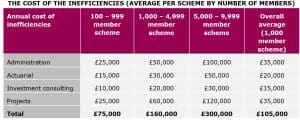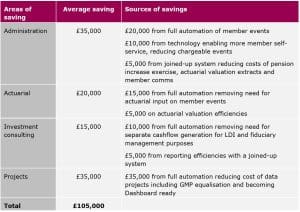- The average 1,000 life DB scheme overspends £105,000 each year due to inefficiencies and lack of automation
- Extrapolating this across the 3,000 DB schemes with between 100 and 10,000 lives means removing these inefficiencies could save up to £300m a year across UK DB schemes
- Modernising DB operating models is essential to reduce inefficiency and generate a wide range of benefits
New research from Spence & Partners (Spence), one of the leading providers of pensions advisory and data services to pensions schemes in the UK, reveals DB pension schemes are collectively spending up to £300 million more than they need to each year due to inefficiencies and lack of automation.
For the research, Spence has assessed the running costs of DB schemes with between 100 and 9,999 members. The study examines administration, actuarial and investment costs (ongoing and project work) because this is where the savings from improving operational efficiency come from. The table below sets out the estimated cost of the existing inefficiencies for different scheme sizes.
The research has found that inefficiencies occur in DB schemes where scheme advisers interact and share data between each other. The current typical operating model is complex and not well-automated. Typical DB scheme systems are fragmented with data moving between as many as five different systems on average. The lack of automation in the process leads to an overuse of spreadsheets, data manipulation off-system, and basic tasks performed by overqualified resources.
SCHEME SAVINGS FROM REMOVING INEFFICIENCIES
Spence has calculated that removing inefficiencies could save an average 1,000 life scheme £105,000 per year in running costs. The savings come from automation of manual processes, the efficient movement of data between advisers and removal of unnecessary checking processes and oversight that add no value. The table below provides the details for an average scheme.
Beyond the cost savings, modernising DB operating models has broader benefits for scheme trustees and employers. These include reaching insurance buy-out or superfund consolidation quicker for schemes aiming at a settlement endgame. For schemes planning to run-on, it generates more surplus for sharing with members or sponsors. Modernising operations also reduces operational risk by improving data integrity and cyber risk by holding information in a single, secure system. Finally, it improves the service that scheme members receive by freeing up administrators’ time to focus on the customer experience.
Alistair Russell-Smith, Head of the Corporate Advisory Practice at Spence & Partners, comments: “The pensions advisory and administration market is fragmented, with a wide variety of systems being deployed to manage schemes. Many schemes are serviced by older software, augmented by a range of sticking plaster solutions to get them to provide a basic service for pension members and fulfil their regulatory requirements. This creates inefficiency within the market. Every pound companies spend on running their pension schemes is a pound not spent on member benefits or other company priorities. This is a challenge for policymakers as well as individual schemes. Using modern processes and systems is necessary for plugging DB schemes into the Pensions Dashboard in a timely and cost-effective way.
“The good news is there are already a range of newer, more efficient operational models available in the market for schemes looking to reduce running costs. Options to cut costs include using bundled services, switching to a sole professional trustee, moving to multi-trust solutions, or joining a DB master trust. Most of these have had significant investment, use technology effectively, and in some cases rely on just one system to manage all data flows. Our calculations show these solutions just need to be adopted by more schemes to access the £300m a year of savings.”
The full Spence DB Scheme Running Costs Report is available here.



